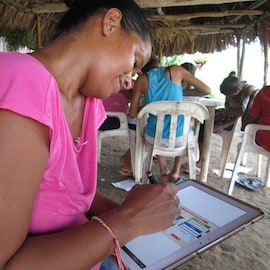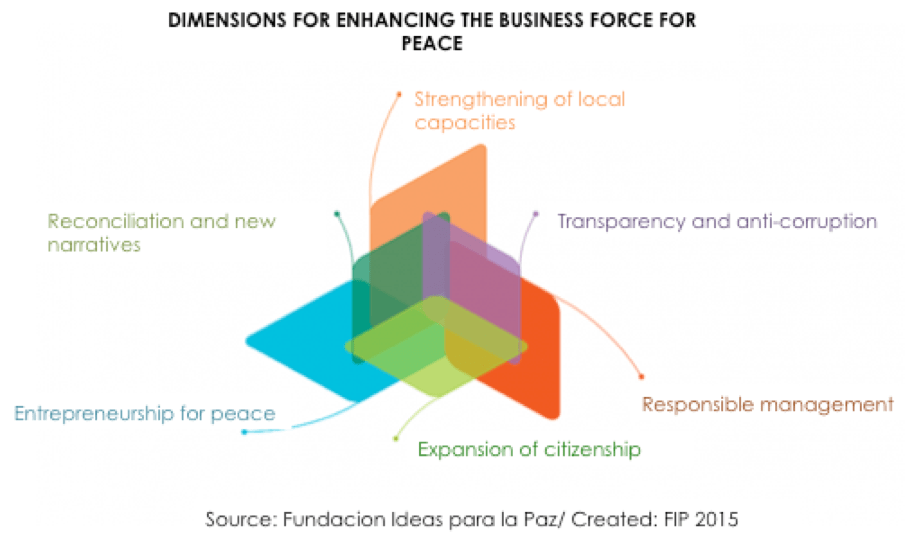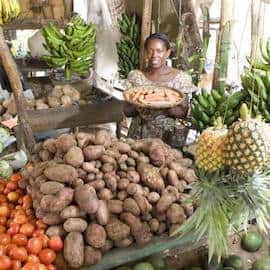Peer Mentorships Helping Colombia Write Its Next Chapter
Editor’s note: This post is the second in a series that explores the way in which the Graduation strategy, a program that helps families in extreme poverty “graduate” into sustainable livelihoods, is changing the lives of millions of families – and how Fundación Capital is changing and adapting the program to reach even more people. To read the first post, click here.
Fifty years of internal conflict made war the norm in many parts of Colombia, but the scars and toil and economic destruction did not quash hope and resolve for a better life, even for those surviving on just a dollar or two a day.
Astrid knows all about both the scars, which can be seen on her skin, and the memories, not visible but still vivid. She knows about the hope as well, which can be seen in the faces of the people she visits each week. Astrid is a peer mentor, working with the government in one of its reparations programs, Transformando mi Futuro (Transforming My Future, or TMF), that employs a Graduation approach to help those living in extreme poverty lift themselves to a more sustainable life.
Astrid is turning this difficult past into a promising future, both for herself and those she mentors. She coaches others affected by the conflict to build life plans and even launch small businesses. Her philosophy is that you must “paint your life with colors,” and she is using her stories and her own success to help others find a new colorful way forward as well.
Hope beyond the hardship
Alongside national governments and community partners, Fundacion Capital employs Graduation strategies that use entrepreneurship training, exposure to new technologies, a suite of carefully timed resources and capacity-building to help them “graduate” into sustainable livelihoods.
TMF seeks to support, via personalized visits and digital tools, the income-generation projects of individuals affected by the violence and who are currently in Colombia’s reparations process. The program has, to date, reached more than 3,000 individuals and their families.
Applying Graduation approaches in diverse areas, including those suffering from post-conflict stress and poverty, helps build confidence in its ability to scale wherever extreme poverty persists. And scaling Graduation programs like these, with proven track records of helping those living in extreme poverty, could be the key not only to helping countries like Colombia write their next chapters, but also to the top global goal of defeating poverty by 2030, as established by the 2015 UN Sustainable Development Goals.
Peer-to-peer in Graduation approaches
In Astrid, TMF participants see not just a mentor but also a peer, someone who has been through similar suffering and understands the struggle to go forward. This personal connection, built around a shared – albeit painful– experience, forms a powerful connective bond and has been a successful program adaptation.
“That one victim is training another, that we work with our peers, is like working in a team,” Astrid says.
Peer education refers broadly to a range of methodologies based on the sharing of knowledge between people with some degree of connection, whether defined by gender, age, culture, sexual orientation or any other social or demographic variable. These strategies have been used from formal classroom settings to youth sexual education programs to the work of the International Development Research Centre (IDRC) and the Organisation for Economic Cooperation and Development (OECD). Inspired by its successes in other settings, the Colombian government and Fundación Capital began integrating peer mentorship into the Graduation projects, unlike most other programs that usually hire external mentors.
“Perhaps we can understand each other better as victims, because we know that we have lived the same, a violence that has lived in this country that not all have felt equally as those who have lived it in their own lives,” said a participant mentored by Astrid.
Human-centered approaches
Peer learning provides mutually beneficial relationships that advance the knowledge and well-being of all participants. This helps create the safe learning environment that is key for working with vulnerable populations.
The mentors provide relevant examples and suggestions, and explain them in ways that are easily understood by the participants. Having experienced many of the same situations, mentors help participants brainstorm solutions rooted in local context and in the resources available.
In addition to fostering a learning environment of trust and confidence, the use of local mentors is an investment in the community itself and a form of local capacity building.
The best way to promote long-term changes in these poor and often isolated communities is to invest in them – supporting some citizens through their participation in the Graduation program and others through training and enabling them to earn a salary while supporting their peers. With this, the knowledge and experience stays in the community even after the program is over. And the mentors themselves continue on their own journey toward empowerment and serve as examples of what is possible, of what can be achieved even in the face of past struggles. As one participant said, “If they can, I can, too.”
For more about Fundación Capital’s peer-to-peer model, check out this video:
Mauricio Romero is in charge of research and evaluations at Fundación Capital.
Photo of Astrid (left) courtesy of Fundación Capital via Flickr
- Categories
- Education



